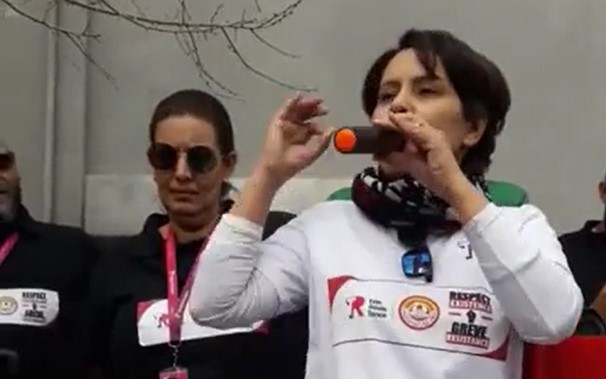
Mar 19, 2021
Citing dangerous work conditions and inadequate wages, an imminent call-center strike was announced this week by French union Solidaires Unitaires et Démocratiques (SUD), with the Moroccan Labor Union (UMT) and Tunisian General Labor Union (UGTT). The strike will target all company sites in France, Morocco and Tunisia on March 24 and 25, said the unions in a joint statement.
Headquartered in France, Teleperformance has more than 300,000 employees across 450 contact centers in 83 countries and serves more than 170 markets. Media outlets have reported on the overcrowding and endangerment of its employees in many countries, including France and Greece, and in Portugal where health authorities ordered the closure of a center.
Health and safety complaints cited in the strike announcement include that workers:
- Are sleeping on the floor in call centers in the Philippines
- Are endangered by insufficient personal protective equipment, including masks, inadequate social distancing and a requirement that they share workstations—including headsets and computers—without adequate cleanup between shifts
- Have their salaries withheld for refusing to work under such unsafe conditions
The strike announcement also calls for wage increases, given Teleperformance’s profitability and the risks faced by workers.
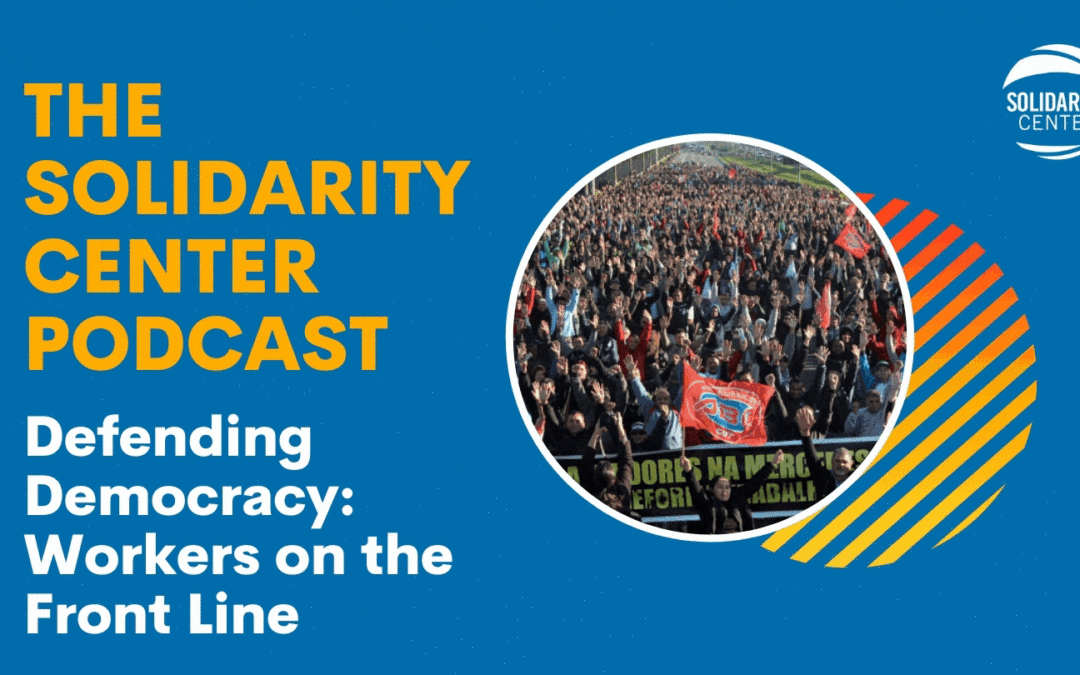
Mar 19, 2021
Democracy is under siege around the world with the subversion of democratic processes and outright coups—and attacks worker rights are a big part of authoritarian efforts to cut off civil liberties.
On this week’s Solidarity Center Podcast, two worker advocates from countries where democracy is under threat—Belarus and Brazil—discuss how workers are pushing back against repression and are building a better future for their countries, one that recognizes worker rights are a foundation of true democracy.
Maximilano Garcez, president of the Brazilian Association of Union Lawyers, represented families of the 272 people who died in a preventable mining disaster in 2019. The Brumadinho mining waste dam, held by walls of sand, collapsed during rainy season cutting a path of destruction from the mine and for miles into the surrounding community. It is among nearly 100 mining dams in the country built the same way.
The mining disaster was “industrial homicide”—the result of corporations “incentivized to greed” in a system where “killing people has been worthwhile,” says Garcez.
Workers Rise Up in Belarus Against Repressive Regime
Also on the show, Sergey Antusevich, vice president of the Belarusian Congress of Democratic Trade Unions, describes the recent uprising against the country’s repressive regime in which workers, led in many cases by women, have taken a key role.
“Many factories began to express a position actively, protest against violence and fraud, and started for the first time in Belarus history to set up strike committees” despite a strike ban, he says.
“At the same time, the protesters made demands: resignation of Lukashenko and his clique and an end to violence and repression and holding fair elections. At the same time, workers and employers began to quit the state trade unions and tried to create independent trade unions.”
The Solidarity Center Podcast, “Billions of Us, One Just Future,” highlights conversations with workers (and other smart people) worldwide shaping the workplace for the better.
Join us for a new episode each Wednesday at iTunes, Spotify, Amazon, Stitcher or wherever you listen to your podcasts.
Solidarity Center Podcast Schedule
- March 24: Preeda, a migrant worker rights activist in Thailand working with unions to help migrant workers meet the challenges of COVID-19.
- April 7: Francia Blanco, a domestic worker and trans rights activist reaching marginalized workers through her all-trans domestic workers union.
- April 14: Adriana Paz, an advocate with the International Domestic Workers Federation who understands firsthand the power of unions in ensuring domestic workers have safe, decent jobs.
- April 21: International Trade Union Confederation President Ayuba Wabba, who explores the Nigerian labor movement’s response to the COVID crisis on workers and discusses the global labor movement’s plans to build back better for workers around the world.
This podcast was made possible by the generous support of the American people through the U.S. Agency for International Development (USAID) under Cooperative Agreement No.AID-OAA-L-16-00001 and the opinions expressed herein are those of the participant(s) and do not necessarily reflect the views of USAID/USG.
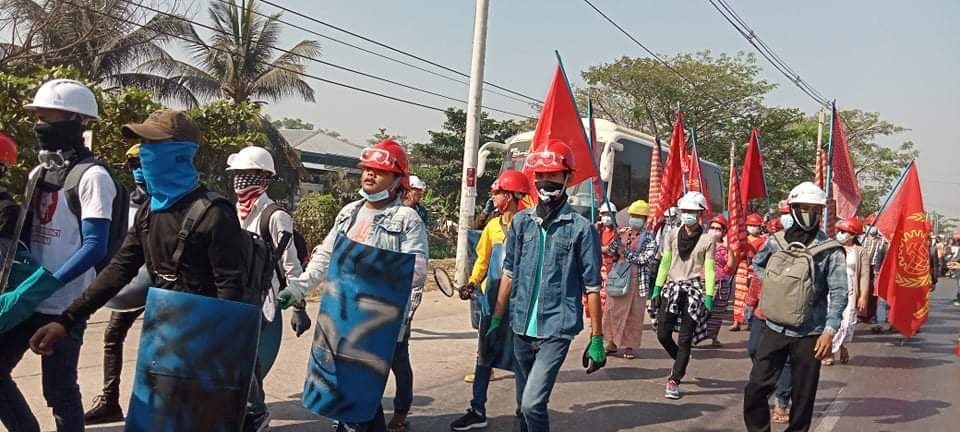
Mar 19, 2021
At least two union members were confirmed killed by the Myanmar military this week and at least six workers were shot dead at the Xing Jia shoe factory in the Hlaing Thar Yar industrial zone Tuesday, according to union leaders. The factory workers, including the woman leader, were shot after the employer called the police when they demanded unpaid wages. Seventy workers were arrested and loaded onto two prisoner trucks.
Union leaders say the police and military violence against protesters in the industrial zones is much worse than is being reported because nationwide internet service repeatedly has been cut, including on Sunday before a violent crackdown.
Also this week, one union leader from the Federation of General Workers Myanmar (FGWM) was arrested while walking to the FGWM office but was released later that night.
Workers Targeted for Standing Up for Democracy
Workers, especially women, have taken a leading role in the civil disobedience movement (CDM) that began February 1, following the military ouster of elected officials, including leader Aung San Suu Kyi. At least 217 people have been killed.
Garment workers, led by women union leaders, have demanded global corporate fashion brands tell factory owners to respect workers’ rights, including the freedom to freely express themselves and peacefully gather.
The Confederation of Trade Unions-Myanmar (CTUM) is requesting international financial institutions freeze all activities in Myanmar, saying all activities with government ministries translate as support for the coup. The CTUM also is calling on companies to protect and respect freedom of association and the rights to assemble and peacefully protest and must help ensure that no worker or union leader will be punished for joining the CDM.
The military is now targeting workers on several fronts, moving into industrial zones and declaring martial law. The military also issued a public statement that public-sector workers must return to work by Monday or they will be criminally charged.
Nearly all factories in the Yangon area, including in major industrial zones, have closed, and union leaders report a mass exodus of factory workers from the industrial zones to their hometown rural villages.
The military is asking factory owners to disclose the names and addresses of trade union leaders to arrest them, and soldiers are going door to door in the worker dormitories and hostels in a bid to find them, according to Khaing Zar Aung, president of the Industrial Workers Federation of Myanmar (IWFM).
Key union leaders of CTUM and affiliated unions were forced into hiding after the military issued a secret list of 27 trade union leaders to be persecute, she writes.
The global labor movement has condemned the military coup, including the International Trade Union Confederation, AFL-CIO and IndustriALL, which called for the immediate restoration of democracy.
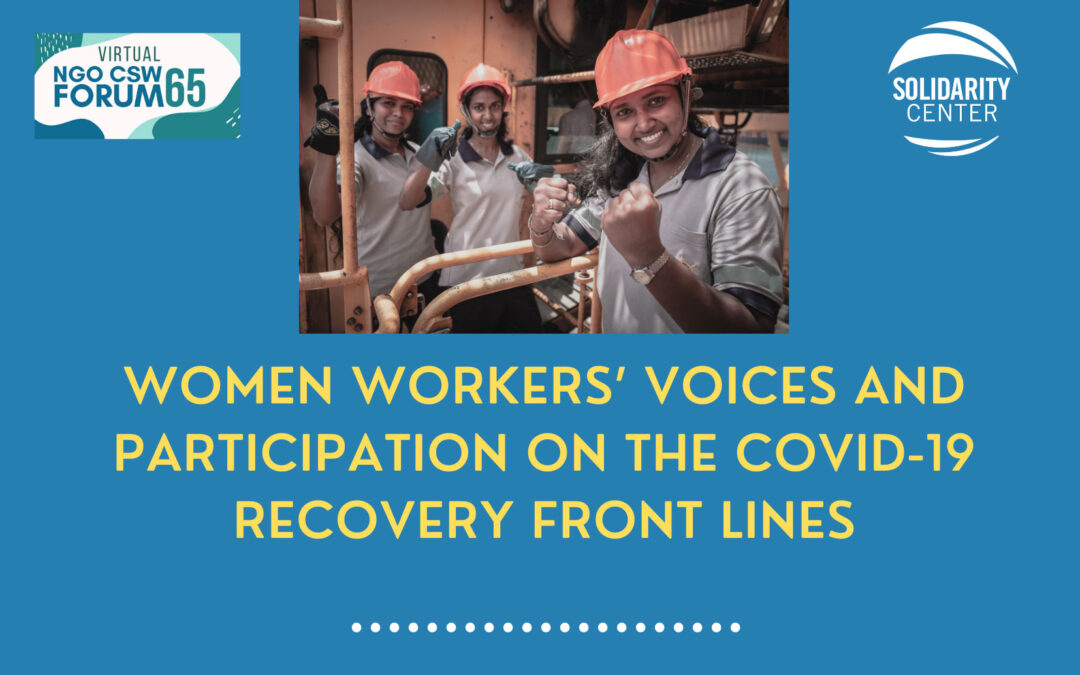
Mar 17, 2021
The COVID-19 pandemic has hit workers hard—but women have especially suffered compared with men, experiencing higher rates of unemployment, discrimination and exposure to the virus, and skyrocketing rates of gender-based violence and harassment (GBVH), speakers said this week at a Solidarity Center panel. Unions are organizing to demand that government responses to the pandemic’s economic and social effects center on the needs and experiences of women workers, ensuring safety and respect for all workers.

“Women have suffered because most of the work they do is precarious”—Rose Omamo, Kenya
“Women have suffered because most of the work they do is precarious—they are informal workers, frontline workers,” said Rose Omamo, general secretary of the Amalgamated Union of Kenya Metalworkers. Omamo explained how COVID-19 has shown the need to extend social protections like paid sick leave and health care to all workers, and to address issues affecting women in Kenya and worldwide. She shared that rape and sexual assault in the world of work has increased because of economic stress caused by the pandemic, including an increase in domestic violence and increased demands for sexual favors in order to obtain or keep a job. Kenyan unions are organizing to demand that social protections include access to reproductive health services in light of increased sexual violence, and are bargaining with employers to increase protections against GBVH in the workplace.
Omamo was among five women union leaders and Solidarity Center partners who took part in “Women Workers’ Voices and Participation on the COVID-19 Recovery Front Lines,” a virtual parallel event during the United Nations Commission on the Status of Women (CSW) as part of the NGO CSW65 Virtual Forum.
Employers, Government Failing Women Workers in the Pandemic

Employers have used COVID-19 as an excuse to violate worker rights, says Cambodian union leader Ou Tepphallin.
Employers have taken advantage of the pandemic to exploit, abuse and lay off workers, panelists said. “Labor rights have been violated during COVID-19 as employers used the opportunity to exploit the system,” said Ou Tepphallin, president of the Cambodian Food and Service Workers Federation.
Retail, hospitality and garment workers in Cambodia, the majority of whom are women, have not been provided adequate personal protective equipment (PPE) or measures to ensure their safety, and unscrupulous employers have taken advantage of the crisis to exploit and abuse workers. For example, workers in the hospitality sector report that entertainment venues have opened illegally during lockdown and forced workers to return to work. Some companies deliberately targeted older or less conventionally attractive workers for layoffs. Unions have been organizing to hold employers to account, negotiating for better protection measures, including protections from GBVH.

When women are in unions, they can speak out against mistreatment and come together to create solutions, says Honduran union leader Iris Munguia.
In Honduras, the impact of the pandemic collided with ecological and social crises. The devastation caused by two hurricanes in November 2020 left many women homeless and struggling to support their families, said Iris Munguía, women’s coordinator of the Honduran Federation of Agro-industrial Unions (FESTAGRO). In addition, women experience extremely high rates of GBVH, which is treated with impunity in Honduras. More than 30 women have been murdered in 2021, and “there are no investigations of these murders,” Munguia said.
The combined crises have left women workers more vulnerable than ever to exploitation and abuse. The majority of workers laid off during the pandemic were women, and unions have been organizing to ensure women workers are at the bargaining table to win protections from employers, including access to childcare, adequate protective equipment and protections against GBVH at work. Unions in the agricultural sector are demanding that multinational companies do more to ensure greater safety on the job. Munguia discussed the power of union organizing, stressing that women in trade unions had the ability to speak out against mistreatment and come together to create solutions.
In Honduras, Munguía is part of a campaign for C190 ratification, while also training women to be part of negotiations with employers so they can advocate for contract clauses that benefit them, such as childcare and a violence-free workplace.
“We have a great advantage by being unionized,” she said. “Whenever we face discrimination, harassment, we can report it, denounce it, talk about it—and that opportunity is there because we are part of a union.”
‘We Have a Great Advantage: We Are in a Union’
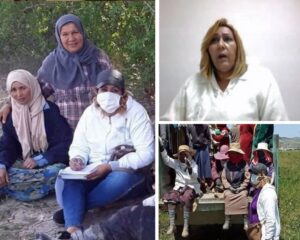
UGTT’s Nadia Bergaoui shared images of women agricultural workers as she discussed the challenges they face at work.
In the face of such challenges, women have stepped up their efforts to achieve justice at the workplace, according to the panelists, including efforts to push their governments to ratify Convention 190. Adopted by the International Labor Organization in 2019, the convention seeks to end violence and harassment in the world of work, including gender-based violence.
Across Tunisia, where 500,000 women work in the informal agricultural sector, the Federation of Agriculture and the Tunisian General Labor Union (UGTT) are working to end gender-based violence through awareness-raising programs that ensure women know their rights on the job and can speak out for safe conditions, especially on the dangerous transport to and from work, said Nadia Bergaoui.
Bergaoui, general secretary, media officer and women’s affairs officer of the Federation of Agriculture, said a union survey in 2020 found that more than half of women said they have faced verbal or physical abuse on the job, and lack access to paid time off, sick leave or health care. The union is organizing workers to demand safe transportation, protections against GBVH, PPE and access to social protections.
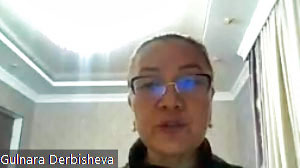
Unions in Kyrgyzstan are advocating for protections for women workers, says Gulnara Derbisheva.
Gulnara Derbisheva, director of Insan Leilek, discussed how unions in Kyrgyzstan are advocating for protections for women workers, including demanding that the government address the increase in GBVH during the pandemic by ratifying Convention 190. Unions, with Solidarity Center support, opened a women migrant worker center in Bishkek, where workers have reported increases in GBVH and other abuse on the job. She shared how she is working with unions to advocate for greater protections for women migrant workers, including ratification of C190.
“Unless we keep advocating, we will be in a standstill,” she said.
Watch a recording of the event, simultaneously translated for Arabic, English, Khmer, Russian and Spanish speakers.
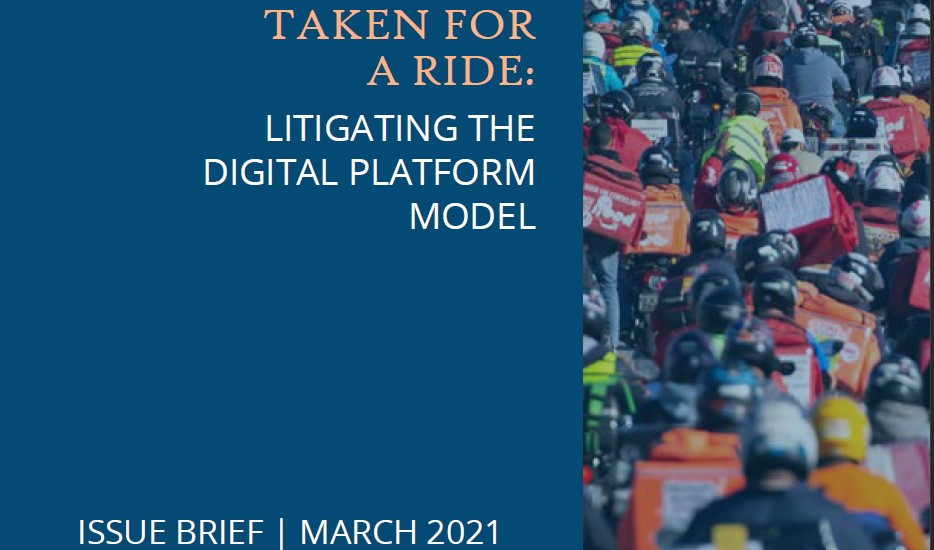
Mar 17, 2021
Gig economy companies employ multiple strategies that undermine gig worker rights around the world, according to a new issue brief by the International Lawyers Assisting Workers (ILAW) Network, a project of the Solidarity Center.
“Taken for a Ride: Litigating the Digital Platform Model,” released today, analyzes how companies such as Deliveroo, Foodora and Uber deprive couriers and drivers of their basic employment rights globally.
“The collection of cases analyzed in this report reveals the extraordinary extent to which these companies are embroiled in litigation around the world,” write co-authors Nicola Countouris, labor law professor at University College London (UCL) and research department director for the European Trade Union Institute (ETUI), and Jason Moyer-Lee, a fellow at Georgetown University’s Kalmanovitz Initiative for Labor and the Working Poor.
The brief details a string of losses for gig economy companies, including before the highest courts of France, Spain and the United Kingdom, and in lower tribunals from South Korea to Uruguay. Such worker victories have come at great cost and, due to weak enforcement regimes, gig economy companies often do not extend rights even after losing cases, concludes the report.
In countries where companies have seen more success—such as South Africa and the United States—the analysis shows how gig economy employers have deployed multiple tactics to pull off the victories, such as forcing workers into arbitration, making them sign complex and convoluted contracts, or relying on an international corporate structure.
The brief recommends gig workers pursue strategic litigation, complemented by collective action, campaigning and communications strategies targeted at local lawmakers, with a special focus on enforcement. And governments, the brief states, “must proactively and rigorously enforce the law,” while applying penalties stiff enough to dissuade unlawful behavior.
“These companies have gone to great lengths to insulate themselves from responsibility and have put an extraordinary burden on workers to claim their basic rights at work. Governments must step in now and enact legislation that protects the rights of all workers providing labor to a digital platform company,” says Solidarity Center Rule of Law Department Director and ILAW Network co-founder, Jeffrey Vogt.
The report was made possible with funding from the Ford Foundation.










